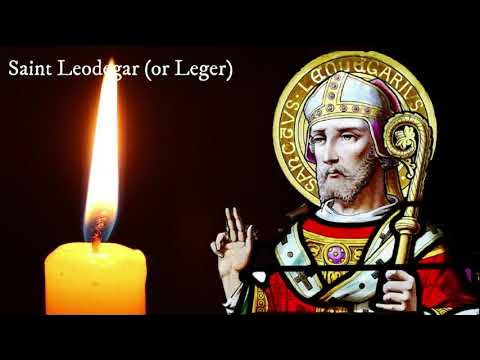Shortly afterwards he became a Priest and in 650, with the Bishop’s permission, became a Monk at the Monastery of St Maxentius in Poitou. He was soon elected Abbot and initiated reforms including the introduction of the Benedictine rule.
Around 656, about the time of the usurpation of Grimoald in Austrasia and the banishment of the boy-heir Dagobert II, Leodegar was called to the Neustrian court by the widowed Queen Bathilde to assist in the government of the united kingdoms and in the education of her children. Then in 659 he was named to the See of Autun, in Burgundy. He again undertook the work of reform and held a council at Autun in 661. The council denounced Manichaeism and was the first to adopt the Trinitarian Athanasian Creed. He made reforms among the secular clergy and in the religious communities and had three baptisteries erected in the city. The Church of Saint-Nazaire was enlarged and embellished and a refuge established for the indigent. Leodegar also caused the public buildings to be repaired and the old Roman walls of Autun to be restored. His authority at Autun placed him as a leader among the Franco-Burgundian nobles.
Meanwhile, in 660 the Austrasian nobles demanded a king and young prince Childeric II was sent to them through the influence of Ebroin, the mayor of the palace in Neustria. The queen withdrew, from a court that was Ebroin’s in all but name, to an abbey she had founded at Chelles, near Paris. On the death of King Clotaire III in 673, a dynastic struggle ensued, with rival claimants as pawns; Ebroin raised Theoderic to the throne but Leodegar and the other Bishops supported the claims of his elder brother Childeric II, who, by the help of the Austrasians and Burgundians, was eventually made king. Ebroin was interned at Luxeuil and Theoderic sent to St Denis.
Leodegar remained at court, guiding the young king. In 673 or 675, however, Leodegar was also sent to Luxeuil. The cause, a protest against the marriage of Childeric and his first cousin, is a hagiographic convention; as a leader of the Austrasian and Burgundian nobles, Leodegar was easily represented as a danger by his enemies. When Childeric II was murdered at Bondi in 675, by a disaffected Frank, Theoderic III was installed as king in Neustria, making Leudesius his mayor. Ebroin took advantage of the chaos to make his escape from Luxeuil and hasten to the court. In a short time Ebroin caused Leudesius to be murdered and became mayor once again, still Leodegar’s implacable enemy.
About 675 the Duke of Champagne, the Bishop of Châlons-sur-Marne and the Bishop of Valence, stirred up by Ebroin, attacked Autun and Leodegar fell into their hands. At Ebroin’s instigation, Leodegar’s eyes were gouged out and the sockets cauterized and his tongue was cut out. Some years later Ebroin persuaded the king that Childeric had been assassinated at the instigation of Leodegar. The Bishop was seized again and, after a mock trial, was degraded and condemned to further exile, at Fécamp, in Normandy. Near Sarcing he was led out into a forest on Ebroin’s order and beheaded.
A dubious testament drawn up at the time of the council of Autun has been preserved as well as the Acts of the council. A letter which he caused to be sent to his mother after his mutilation is likewise extant.
In 782, his relics were translated from the site of his death, Sarcing in Artois, to the site of his earliest hagiography – the Abbey of St Maxentius (Saint-Maixent) near Poitiers. Later they were removed to Rennes and thence to Ebreuil, which place took the name of Saint-Léger in his honour. Some relics are still kept in the Cathedral of Autun and the Grand Séminaire of Soissons. In 1458 Cardinal Rolin caused his feast day to be observed as a holy day of obligation.

